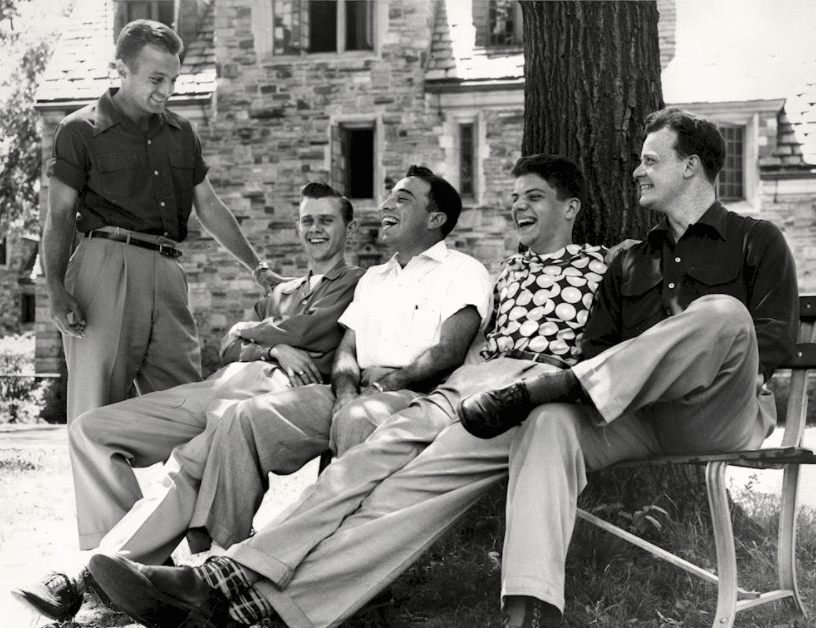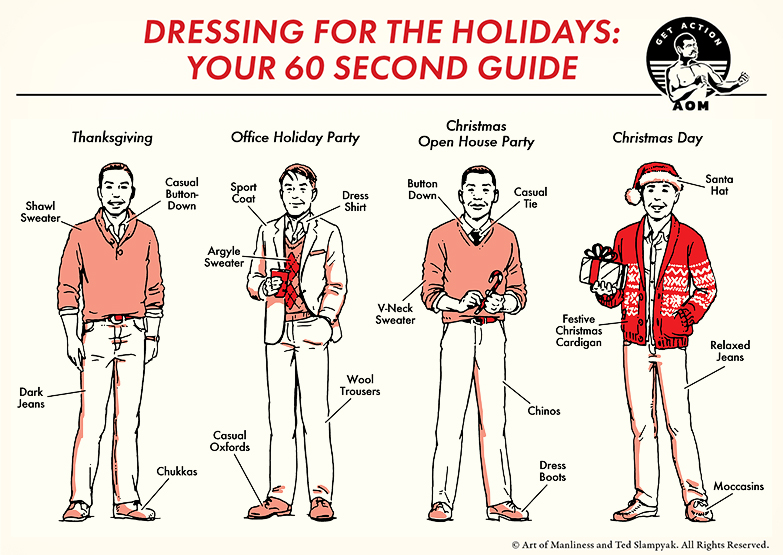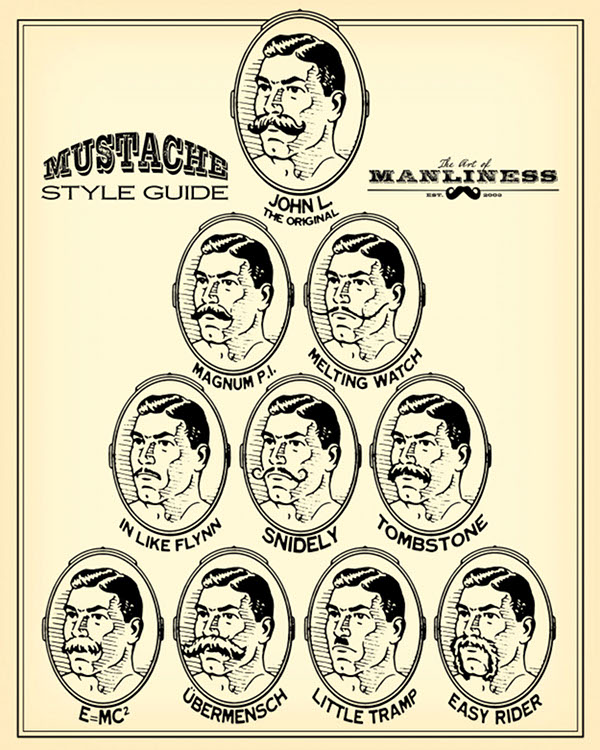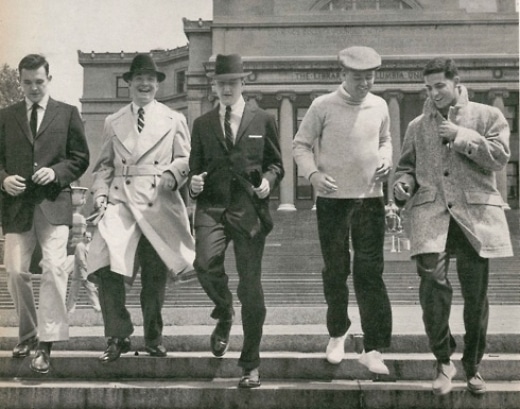In ages past, men made shifts in their wardrobes as they got older; certain clothes denoted a man’s stage in life, stature, and maturity.
Today, the generational lines between clothes are blurrier. But the things you want to communicate and do with your clothes still change as you get older, and there remain looks and style choices that are more appropriate to particular decades of life than others. To help you navigate these passages and look great at every age, this year we’ll be offering guides to dressing sharp and casual in your 20s, 30s, 40s, 50s, 60s, and beyond.
First up: those post-collegiate 20-something years where you’re striking out on your own — figuring out a course for your life, as well as your personal style. Your wardrobe will likely become progressively more conservative as you get older, befitting your developing maturity, desire to project stability and authority, and the fact you’ve settled on the style you like best. But in this decade, you can still afford to experiment with more fashion-forward choices, as they’ll be taken for granted much more than they will be when you’re in your 40s.
So get ready for some self-expression as we take you through some good options for a man in his 20s. You’re at an age where you’re encouraged to look unique. Take advantage of it while you can.
Casual in Your 20s: Needs and Wants
When we say “casual” we mean a broad range of clothes that you wear for your own personal pleasure and non-work events.
Your work wardrobe is, well, your work wardrobe. This is about taking a look at what you wear when you’re just being you. We could call them “social” clothes just as well as “casual,” and it might even be more accurate — most men don’t think of suits as “casual,” but a suit may well be part of your casual wardrobe.
So what should a 20-something man be thinking of when he ponders his casual wardrobe?
1. Fit
It’s the most important characteristic of every piece of clothing you own. If you don’t believe us, try wearing socks that are two sizes too small (or too large) for a day. Pretty uncomfortable, huh?
Now multiply that discomfort across your whole body. That’s what poorly-fitted clothes feel like — and they look even worse than they feel.
Most men in their 20s haven’t discovered the power of personal tailoring yet. Beat the curve by getting to know a professional tailor in your home town.
You’re not going to be buying whole closets full of bespoke suits and shirts yet (unless you’re way better paid than we were in our 20s), but what you can do is take all the off-the-rack items you buy to a tailor for custom adjustment.
By having shirtwaists taken in so they don’t billow, sleeves and cuffs adjusted to hit the perfect spot on your wrists and ankles, and trousers fitted snug against your bottom and crotch, you’ll have a silhouette that looks much better than most of your peers’.
Follow our advice on this one step and you’ll already be one of the best-dressed guys your age — and we haven’t even started talking about specific styles yet!
2. Individuality
This is the age to be yourself. It gets frowned upon more and more as you age, sad to say.
That means experimenting a little.
There are some “rules” in fashion, and they’re good to follow, most of the time. Sometimes, though, it’s okay to be a little different. Sometimes breaking the rules is actually a great way to stand out from the crowd.
Whether you’re being a daring rule-breaker or not, the key here is to find your own style and build on it. Are you an urban cowboy kind of guy? A deep-retro fan with a taste for ascots and tailcoats? A leather-jacket biker dude?
Any of those just on their own is a costume. But the elements from those stereotypes, mixed with some day-to-day clothing and accents of your own choosing, stops being a copy-cat look and becomes your own, unique style — just what a man your age wants to be wearing.
3. Respectability
Remember that we’re just talking about your social wardrobe here — the need to look professional in that setting isn’t quite as high a priority as it is in your work clothes.
But a young man still wants to strive for a look that says “I’m an adult, and you can take me seriously.”
That mostly means leaving behind obvious signs of adolescence rather than trying to dress like a veteran businessman or anything like that. You can get plenty of respect in casual clothes — just not in hoodies, ripped jeans, and old athletic shoes.
So be ready to upgrade your look, if needs be, until you’re no longer mistaken for a state school undergrad.
Casual Looks for Your 20s
Spend some time looking at images of men whose style your respect. Movie posters, stills from films and TV, magazine advertisements, fashion shoots — whatever you’ve looked at and thought “Yeah, that looks pretty good.”
Don’t worry too much about whether you can actually dress like the guy in the image or not. You’re just looking for inspiration, not for something to copy exactly.
Now, spend some time breaking down the styles you liked into some basic categories of dressing:
1. Messy or Tidy?
Are the looks you like crisp and tidy, with lots of symmetry and clear boundaries? Or are they more sprawling and messy, with lines and boundaries between different things (hair, clothing, etc.) crossing each other?
That’s your first easy breakdown of style. Both work fine for a casual guy, and there’s nothing stopping you from wearing one look one night and the other the next! Just opt for clothes that suit your target look.
Good “Messy” Clothes
“Messy” looks tend to be layered. Plan on having a mix of textures and colors in there. Clothes with detailing are also good — shirts with epaulets, jackets with big flap pockets, pants with snap pockets, that sort of thing. Mix and match and don’t be afraid to cross some stylistic boundaries (a slim, fitted suit jacket over a T-shirt, for example).
- Jean jackets. Find one, wear it; love it.
- Blue jeans. Fitted, but not too tight, please. You want enough length and looseness that they “break” (crumple a bit) where the cuffs rest on your shoe uppers.
- Corduroys. Soft, flexible, textured. Perfect. And they come in all kinds of colors, letting you spice your wardrobe up.
- T-shirts. Don’t wear them on their own, but throw a vintage tee under a blazer or a leather jacket and you’re good to go. Just make sure it’s a close fit. (And read our ultimate guide to t-shirts.)
- Collarless long-sleeve shirts. Henleys, long-sleeve T-shirts, thin crewneck sweaters, etc. Something that doesn’t have a dress shirt collar and isn’t a basic athletic shirt is always going to stand out.
- Cargo pants. Steer clear of anything so baggy it’s falling off your butt, but some buckles and straps on the pants is fine for casual looks for young men.
- Thrift store sports jackets. Find some old-fashioned blazers, have them adjusted to your fit, and throw them over any old thing. Tweed, corduroy, velvet, and other textured fabrics work particularly well.
- Canvas sneakers. The Converse All-Star might be a little too uniform these days, but it’s a good starting point. Pair casual sneakers with fitted pants and jackets for contrast.
- Scarves. Drape ’em every which way. Lots of folds and color to catch the eye.
Good “messy” looks are, of course, a product of just as much careful arrangement as the neatest and tidiest dandy. Spend some time in front of the mirror mixing and matching and you’ll find something you like. A longer haircut that you can tousle with some product goes a long way toward making a lot of these looks work, too.
Good “Tidy” Clothes
A “tidy” look for young men is all about crisp, clean-cut edges and boundaries. It looks natty and dapper, and often a touch old-fashioned (sorry, “retro”). You want clothes that complement each other, but that doesn’t mean avoiding contrasts — the contrast just happens along neat lines, like the V-shape of a jacket or the straight line of a shirt tucked into the trouser waist.
- Turndown collar shirts. The basic dress shirt is a staple of a tidy wardrobe. Get them in all kinds of colors and patterns, keep them well-pressed, and mix and match freely.
- Blazers. Thrifting works here too, just get the fit tailored and try for blazers and sports jackets with a little structure to them, rather than the completely soft-shouldered look of an unstructured jacket.
- Wool trousers. You can have these pressed to a very dapper-looking crease, and they drape better than cotton pants.
- Chinos/khakis. Cheaper than wool and still easy to press. These days you can get them in tapered/skinny fits as well as straight-leg, if that’s your style. (Read our complete guide to wearing khakis well.)
- Neckties. There’s nothing quite as dapper as a man wearing a necktie when he doesn’t have to. Wear them on weekends or to social events to really catch people’s eyes — but not after 5:00 PM (you can, but it looks more out of place in evening settings).
- Scarves (again). Didn’t we recommend them for “messy” looks? Yep! Do they work for “tidy” looks? Yep again! A neatly-looped scarf looks just fine on top of a pressed shirt and tapered blazer.
- Leather jackets. A slim, moto-style jacket works great on top of fitted clothes. Also a good option when you’re not wearing a collared shirt. (Read more on how to wear a leather jacket with style.)
It’s possible to get a little boring with too much clean-cut, office-acceptable clothing, so make sure you’re choosing social garments with a lot of pattern and color to them. Plaid jackets, houndstooth pants, checked shirts, whatever you like — just make sure you won’t be mistaken for someone on his way to a cubicle job.
2. Vivid or Restrained Colors?
There are all kinds of color palettes to choose from, so breaking it down to just “vivid” and “restrained” is a bit of an over-simplification. But it gets you thinking along the right lines: are you the sort of guy who would wear a light gray blazer with lemon-yellow pants and a white vinyl belt? Or do you prefer a look like dark blue jeans and a striped brown shirt, maybe with a gray tweed jacket on top?
Without getting into schools of color, “seasons,” complexions, and all of that, you can still decide whether you’re a vividly-colored dresser or more of a restrained guy. And, of course, like all of these dualities, you can do both, switching it up from day to day — it just requires a larger wardrobe!
Good Vivid-Color Clothing
A little goes a long way with bright colors on men. You usually want two bright colors at most, with everything else in the outfit either more neutral or complementing one of the bright colors (such as a lavender pocket square worn above bright plum corduroys). Here are some of the best places to work color into your wardrobe:
- Neckties and pocket squares. These are designed to be splashes of color. Use them to spice up an otherwise work-ready wardrobe with something more fun than office-wear usually dictates.
- Trousers. Colored jeans and corduroys have gone from stylistic experiment to de rigueur. It looks a little better in corduroy or chino than it does in denim, but to each their own. And if you want brightness without color, white or light gray trousers do the trick nicely.
- Blazers. You can get into touchy territory here (a bright red blazer usually just makes you look like you’re in a marching band), but some shots of color in a patterned blazer work great. A pink thread running through an otherwise subdued plaid is a good (and common) example.
- Shoes. Drawing everyone’s attention all the way down your body can make you look shorter, but if that’s not a problem for you, get flashy with the shoes. Colored canvas sneakers are a classic, but colored leathers work too.
- Belts. A casual belt is a great place for contrast as long as you’ve got a slim waist (if you don’t, you probably shouldn’t be drawing attention straight to it). Rope belts, canvas belts, tooled leather, colored vinyl, decorative buckles — whichever suits your tastes, the belt is a good place for color.
- T-shirts and casual tops. A bright T-shirt or other non-collared top under a dark jacket is a good young man’s look. Just have the dark jacket there to balance it, otherwise you look more like a teenager or pre-teen wearing his Disneyworld swag than a vibrant 20-something.
With all of these, it helps to have some less eye-catching base pieces to work off of. Plain old blue jeans, khakis, blazers, dress shirts, and so on will help make your accent pieces pop, and will go well with the brighter clothes when you break out vivid-colored jackets or trousers.
Good Restrained-Color Clothing
The most common family of “restrained” colors is probably earth tones, but deep hues (colors shaded with black so that they become darker) and the gray-scale all work well too. If you get too restrained you can start to look boring — a guy in khakis and a light blue shirt looks like he’s going to slave away in a cubicle, not out to have fun. Liven a restrained color palette up with lots of texture and layering so that it looks just as deliberate and eye-catching as the guy in the lime green jeans.
- Blazers. Blazers and sports jackets look great in earth tones and deep hues, especially if there’s texture too, either in the weave (herringbone, birdseye, etc.) or in the thread itself (tweed, flannel, etc.).
- Trousers. Plain old blue jeans, khakis, gray wool slacks, and so on all make great bases for outfits. And they have the added benefit of fading into the background while people’s eyes move on up your body and toward your face, which is the direction you want their gaze
- Dress shirts. Similarly, a lightly-colored dress shirt is a building block that your trousers and jackets and accent pieces can build off of. Don’t scorn the humble white shirt! It and its modest cousins give you room to play around with the rest of your wardrobe.
- Leathers. A bright, stand-out belt is all well and good, but there’s never anything wrong with a simple set of brown leather shoes and a matching belt. If you want eye-catching decorations without the vivid color, go for tooled or brogued leather and let the design speak for itself.
- Sweaters. Good, sturdy wool in earth tones (especially the natural, undyed color of the sheep’s fleece) is as timeless as you can get. Of course, you can wear dark-colored cotton sweaters as well — deep hues like burgundy and forest green look great on their own and as layers under a jacket.
- Outerwear. It takes a special kind of man to wear a brightly-colored leather or denim jacket. Don’t be that man, and stick to browns, blacks, blues, and other modest colors for your outerwear.
You usually want at least a little color in your pocket squares, neckties, and other small accessories. Too much restraint and you start looking Amish. But there’s nothing wrong with outfits done all in earth tones, grays, and deep hues, particularly if you’re smart about getting contrasting textures and patterns in there to spice it up.
Looks the 20-Something Man Should Always Avoid
Some things you can’t get away with at any age; others are only odd-looking in certain age brackets. Here are a few things that you’ll see on young men — and that always look terrible.
- Brand name/logo clothing. There’s nothing expressive about wearing Hollister or A+F logos on your body. All it says is that you buy the same cheap crap as everyone else with no imagination, and are willing to pay for the privilege of being a billboard for a corporate brand. Skip it.
- Undershirts/string tops/scoop necks. An undershirt is just that. Wear it under your clothes, not as a top layer where everyone can see it. Tank tops have their place (mostly on the basketball court), but buy athletic wear for those occasions, and keep your white string tees out of sight.
- Denim on top, denim on bottom. Are you actually a troubled youth expressing his tormented feelings through a life of rebellion and motorcycle racing? Or perhaps a rodeo cowboy? Unless you answered “yes,” don’t wear jeans and a jean jacket. Or leather pants and a leather jacket, for that matter — in fact, you might steer clear of leather pants and chaps entirely, unless you’re actually on a motorcycle or a horse. Mix your fabrics and your textures, is what we’re saying here, even when you’re dressing to look badass.
- Black suits. Men of all ages should really be avoiding these (unless they’re morticians), but they look especially bad on young men. A black wool jacket is fine, from time to time, but pair it with jeans. In a black jacket and trousers you look like a waiter or Blues Brothers wannabe at the very best.
Beyond that, let your social circle and your personal goals be your guide. If you want to schmooze your way to the top at a business firm you probably don’t want a look that depends heavily on tattoos, piercings, and pants with buckles, and if you’re hanging out with a bunch of guys in bands you don’t really need neckties in your casual wear.
Use some common sense, experiment a little, and have fun. It’s what your 20s are all about.
____________________________
Written By Antonio Centeno
Founder, Real Men Real Style
Click here to grab my free ebooks on men’s style








